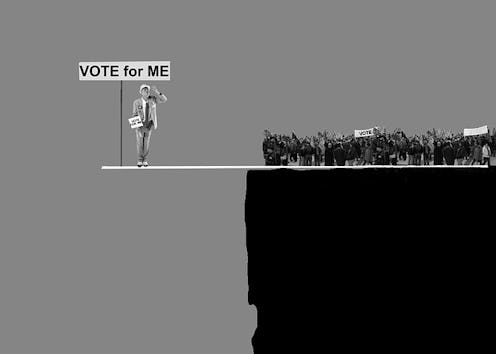
As we speak, we are in the midst of the 2016 primary elections, which is when each political party in the United States selects a candidate for their party for the national Presidential election. It sounds simple enough, right? So how could racism possibly weasel its way into the primary elections? Franchesca Ramsey of MTV's Decoded shows us the surprising race issue that these primaries have behind them.
First, let's get into a little more background of how primary elections work. Primary elections are actually designed to give more power to the people; however, they run into all kinds of issues when you look at the finer details. The primaries always happen in a scheduled order of states, with Iowa and New Hampshire being the first and second states to hold primary elections... which is exactly where some of the problems arise. (We'll get to that in a minute, though.) For the last 36 years, with Bill Clinton being the one exception, every party nominee has won the primary election in Iowa, New Hampshire, or both — so basically, if you don't win one of these primary elections, you have almost no chance of running in or winning the national election.
Remember that whole thing about the order in which the primaries are held being a problem? This is where the issue of race comes into play: The populations of Iowa and New Hampshire are so lacking in racial diversity that they simply aren't representative of the United States as a whole. As Ramsey points out, the population of Iowa is 87 percent white non-hispanic, while New Hampshire's population is 91 percent white. Looking at how that compares to the demographics of the entire country, the United States is only 62 percent white non-hispanic.
You might be thinking that since every state does hold a primary election, the order in which they do so doesn't matter, right? Wrong. As Ramsey explains, their influence is sort of like a really terrible magic trick. Here's how it works:
Step 1: Start By Spending More Time And Money On These First Two Primaries
Because the Iowa and New Hampshire primaries are first, candidates tend to spend more time and money on them than those in any other state. In fact, data that was just released on Republican primary candidate's spending found that they spent as much as $2,303 per vote in these two states this year. That is certainly a lot of dough.
Step 2: Add In An Uneven Amount Press Coverage
"The media then talks about these states a lot because they're first, and candidates spend a lot of time and money there," Ramsey says. Step one (all that extra time and money) leads to step two (more media coverage), which has the effect of making people think Iowa and New Hampshire are Big Deals.
Step 3: Make A Big Deal Out Of These Wins And Use Them As Predictions For Later Primaries
After a candidate wins in Iowa or New Hampshire, the media likes to use these victories as precedent for the rest of the primaries in other states — which then causes people to see only those who have already won a primary as serious candidates who have a chance at winning the national election. You can look at this as a sort of confirmation bias, which is when we seek out information to confirm what we already think is true. Thus, if you already think that because someone won a primary, they have a good shot at being President and vote for them, you're using that previous confirmation to make it become a self-fulfilling prophecy.
Step 4: Finally, Add In Some Inspiration
All of the attention and clout the winners of these two primaries are given then inspires both donors and voters to give these victorious candidates their dollars and votes, Ramsey emphasizes. Thus, the others don't really have a shot at winning.
Step 5: Abracadabra!
"Momentum begets momentum and Iowa and New Hampshire maintain their magic predictive abilities," Ramsey says. "Kind of a sh*tty magic trick when you can see the strings." She's right: It's not magic. It's the status quo in action, remaining in tact without its relative fairness ever being questioned.
If you're wondering what some possible solutions to this primary problem could be, make sure to watch the full video below to get Ramsey's take.